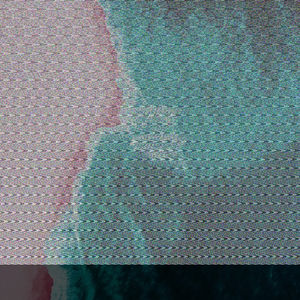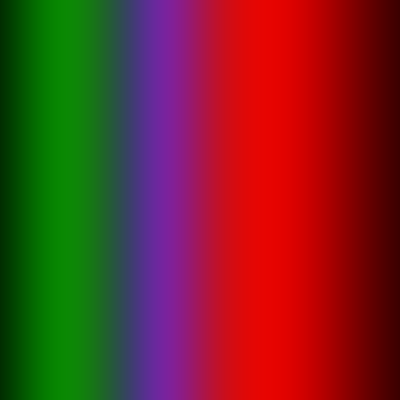User:Alice/Experiments: Difference between revisions
| Line 3: | Line 3: | ||
=Sound to image= | =Sound to image= | ||
Experiments with translating sounds and tones to raw data, and then to images. The resulting image can be superimposed with other images, such as photos and gradients. | ==Experiments with translating sounds and tones to raw data, and then to images.== | ||
The resulting image can be superimposed with other images, such as photos and gradients. | |||
[[File:Superimpose sound.jpg|thumbnail]] | [[File:Superimpose sound.jpg|thumbnail]] | ||
==Experiments with generating a gradient using Python== | |||
<source lang='python'> | |||
import math | |||
from PIL import Image | |||
im = Image.new('RGB', (1000, 1000)) | |||
ld = im.load() | |||
def gaussian(x, a, b, c, d=0): | |||
return a * math.exp(-(x - b)**2 / (2 * c**2)) + d | |||
for x in range(im.size[0]): | |||
r = int(gaussian(x, 231.3135, 666, 201.5447) + gaussian(x, 17.1017, 395.8819, 45)) | |||
g = int(gaussian(x, 129.9851, 157.7571, 108.0298) + gaussian(x, 27.6831, 399.4535, 143.6828)) | |||
b = int(gaussian(x, 3000, 3000, 8.0739) + gaussian(x, 158.8242, 402, 87.0739)) | |||
for y in range(im.size[1]): | |||
ld[x, y] = (r, g, b) | |||
im.save('test2.png', 'PNG') | |||
</source> | |||
[[File:Test2.png|400px]] | |||
Revision as of 12:54, 4 October 2018
Generating flipbooks from YouTube videos
The script and documentation for this can be found here.
Sound to image
Experiments with translating sounds and tones to raw data, and then to images.
The resulting image can be superimposed with other images, such as photos and gradients.
Experiments with generating a gradient using Python
import math
from PIL import Image
im = Image.new('RGB', (1000, 1000))
ld = im.load()
def gaussian(x, a, b, c, d=0):
return a * math.exp(-(x - b)**2 / (2 * c**2)) + d
for x in range(im.size[0]):
r = int(gaussian(x, 231.3135, 666, 201.5447) + gaussian(x, 17.1017, 395.8819, 45))
g = int(gaussian(x, 129.9851, 157.7571, 108.0298) + gaussian(x, 27.6831, 399.4535, 143.6828))
b = int(gaussian(x, 3000, 3000, 8.0739) + gaussian(x, 158.8242, 402, 87.0739))
for y in range(im.size[1]):
ld[x, y] = (r, g, b)
im.save('test2.png', 'PNG')


